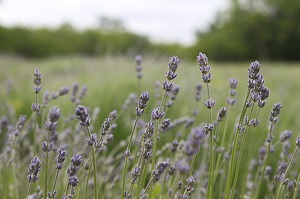
One of the worst things about summer is that the mosquitoes are out in full-force. Being outside in the summer usually consists of putting on bug spray and incessantly swatting away at the little blood-sucking pests before they can sink their teeth in.
Unfortunately, some of the chemicals in bug sprays are dangerous. Therefore, it is understandable that so many people are seeking more natural remedies, especially for their children. Luckily, there are some effective alternatives out there to get the job done without all the additives and chemicals that appear in most store-bought sprays.
Quiz: Is Your Body TOXIC? Take the Test...
(get your free personalized report)
Citronella
Citronella is a plant with a strong scent that mosquitoes can’t stand. You can plant it in your garden, or keep some in a small pot on the windowsill. Alternatively, you can get citronella essential oil in the form of a candle that you can set up inside or outside.
The drawback, according to this journal article, comes from its formulation. If the formulation is right, citronella can be as, if not more, effective than DEET-based repellants. If the formulation is off, however, you will be left with a product that evaporates quickly, leaving you unprotected.
Lemon Eucalyptus Oil
Lemon eucalyptus oil is one of the most well-known natural insect repellants. It is extracted from the leaves of a gum eucalyptus plant. It has a lemon scent to it, which mosquitoes hate, but its scent is not the only reason it works. According to the Eucalyptus Chemical Watch Fact Sheet, it is believed to disguise the environmental indicators that mosquitoes use to find their victims.
The fact sheet also says that it provided between six and seven and half hours of protection to people in a field test in Tanzania. There are many ways you can create your own lemon eucalyptus oil concoction online.
Lavender
Lavender offers a two-fold approach to repelling mosquitoes. The first is its fragrance. While it may smell nice to us, it  is unbearable for mosquitoes. The slightest hint of it will send them packing. The other is the oil that comes from the flowers.
is unbearable for mosquitoes. The slightest hint of it will send them packing. The other is the oil that comes from the flowers.
Quiz: Is Your Body TOXIC? Take the Test...
(personalized report)
You can grow lavender in your garden, or put it in plants and keep it at entertainment areas. Putting a couple of drops of lavender oil onto some ribbons and hanging those ribbons in windows would also be effective at keeping the pests away. But lavender is most effective when you rub it directly on your skin. Doing this will crush the flowers and release the oils.
Catnip
Catnip, also known as catmint and catswort, is a plant that is part of the mint family and contains a chemical called nepetalactone. Nepetalactone is highly attractive to felines, which is how it got its name, but quite revolting to mosquitoes and other insects.
In fact, research conducted by entomologist Chris Peterson reveals that catnip is ten times better than DEET at repelling mosquitoes. Planting it in your yard would be sufficient, but you would have to trim it regularly to keep it from becoming too invasive.
Alternatively, you could crush the leaves and rub them on your skin. This would provide better protection than just having a plant in your yard, but be aware that cats may suddenly be extremely attracted to you.
Peppermint
 Peppermint is a plant whose flavor is commonly present in things like bubble gum and toothpaste. But its oils are also an effective insect repellant—and not just for its smell, which humans tend to love, but mosquitoes loathe.
Peppermint is a plant whose flavor is commonly present in things like bubble gum and toothpaste. But its oils are also an effective insect repellant—and not just for its smell, which humans tend to love, but mosquitoes loathe.
In research highlighted in the Malaria Journal, researchers found that it provided 100% protection for 45 minutes. But repelling mosquitoes is not the only thing it is effective at doing. In this research article, experts found that it is also effective at killing larvae and eggs.
You can grow peppermint plants in your yard for easy access when you need some quick relief from mosquitoes. Simply grab some leaves and crush them to release the scent and the oils. You can also spray it on yourself or others by pouring some peppermint oil into a spray bottle, but peppermint can irritate skin, so you must be careful when using this option.
If you’re looking for some additional solutions, the following are also effective in preventing mosquitoes from feasting on your blood:
- Rosemary and sage
- Tea tree oil
- Neem oil
- Lemongrass
- Garlic
- Mosquito traps
Whether you’re heading to the beach, pool, lake, ocean, traveling or even having a staycation at home, there are lots of tips and tricks you can try out to keep yourself healthy and stay chemical free this summer. And if you’re not headed out, here are some ideas for gentle pest control for your home.
